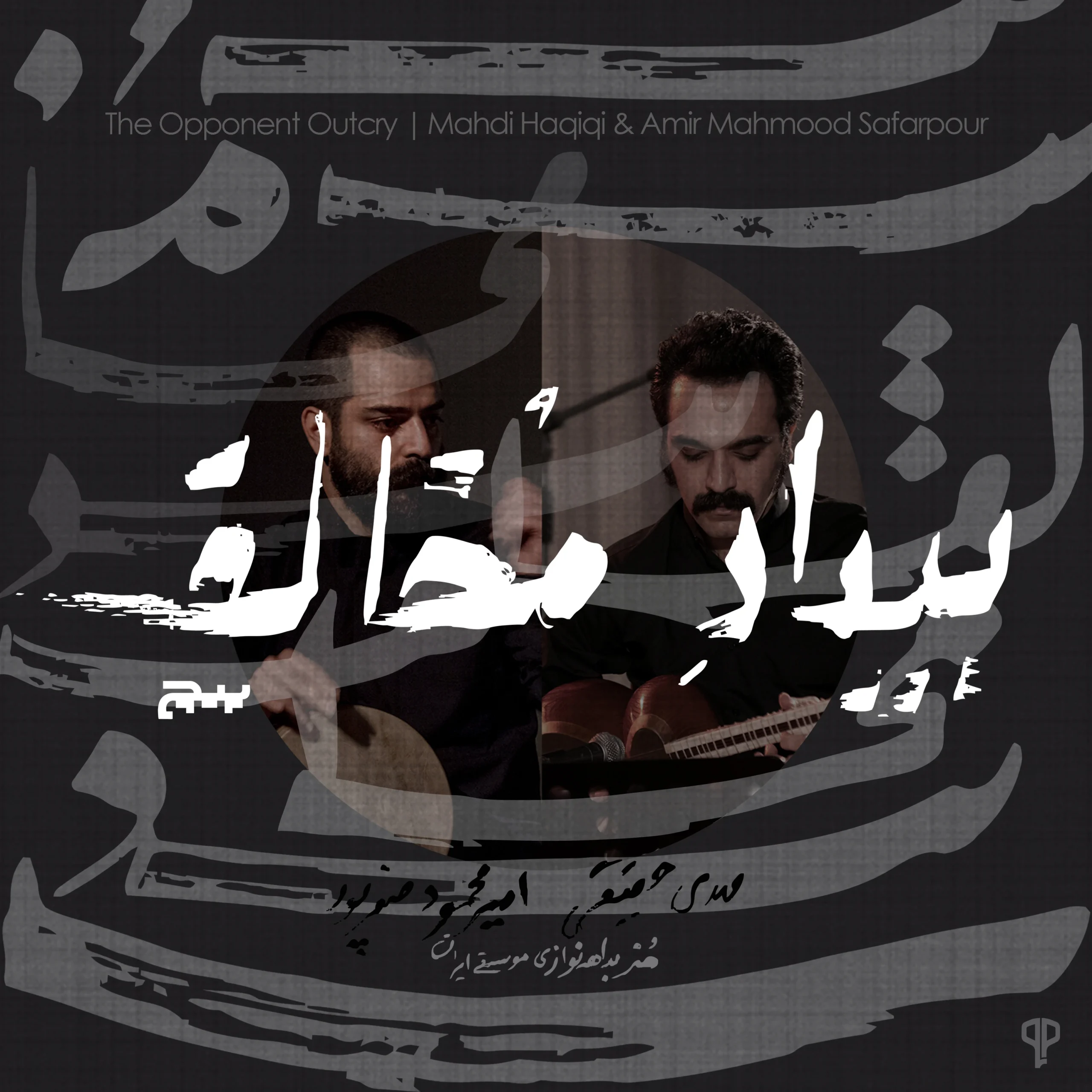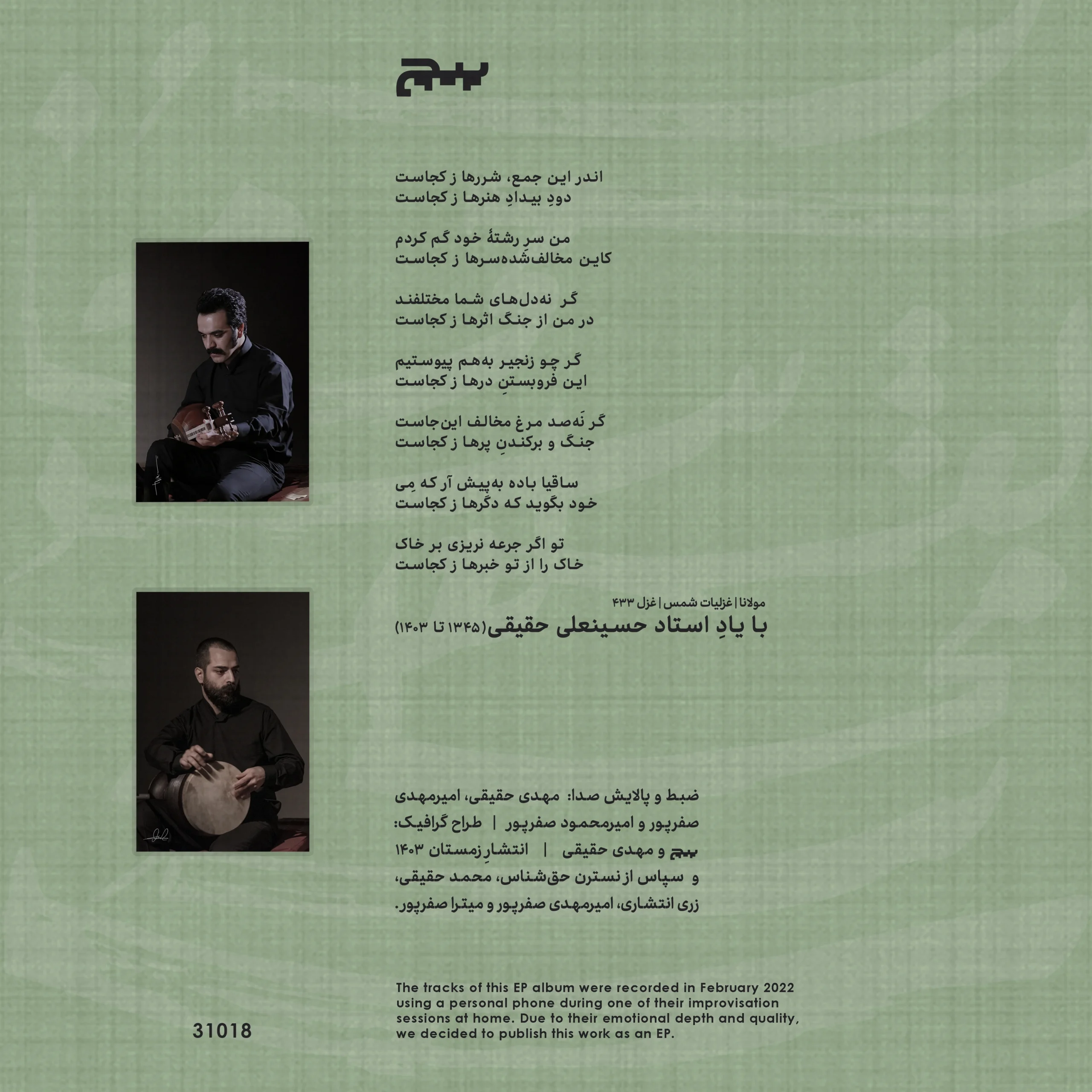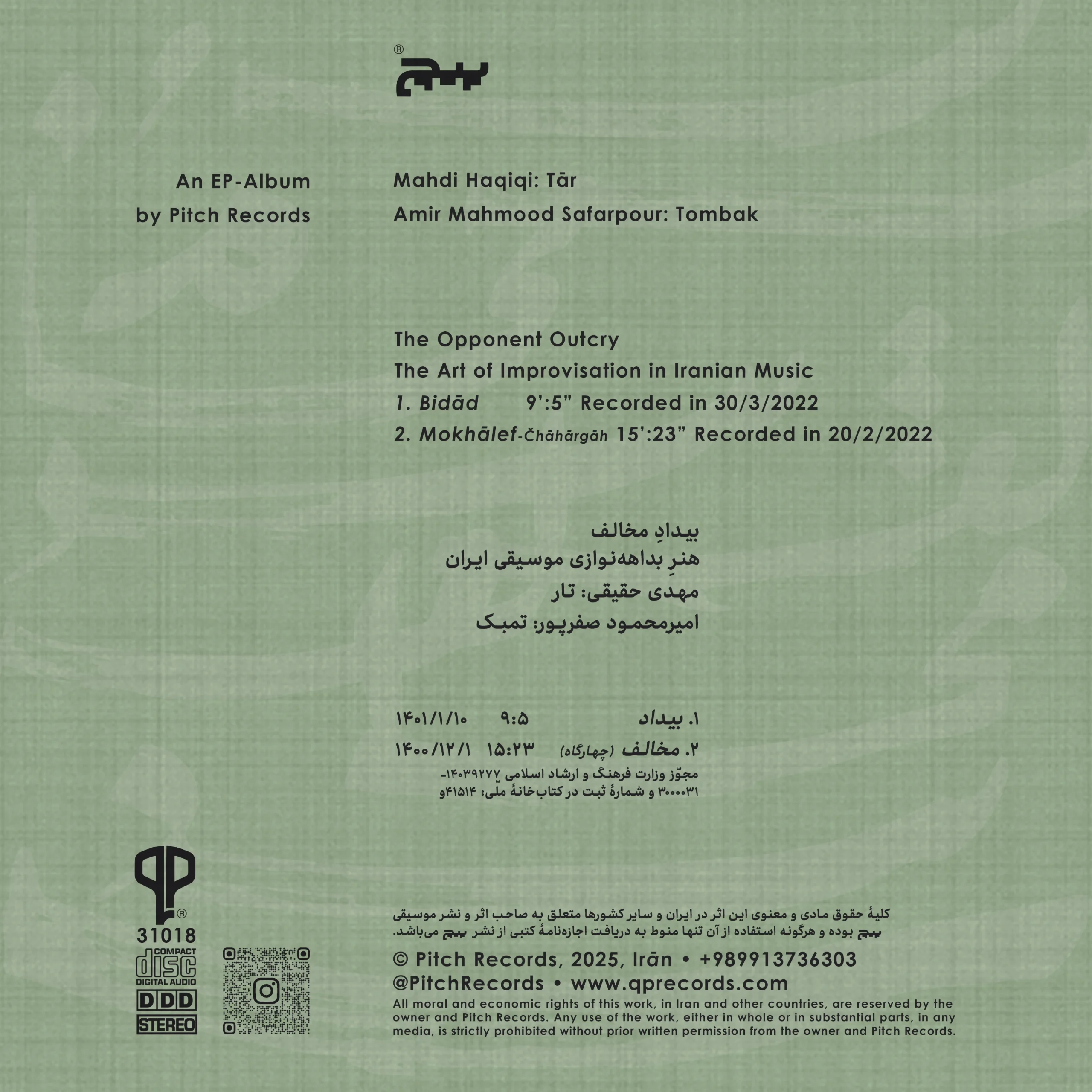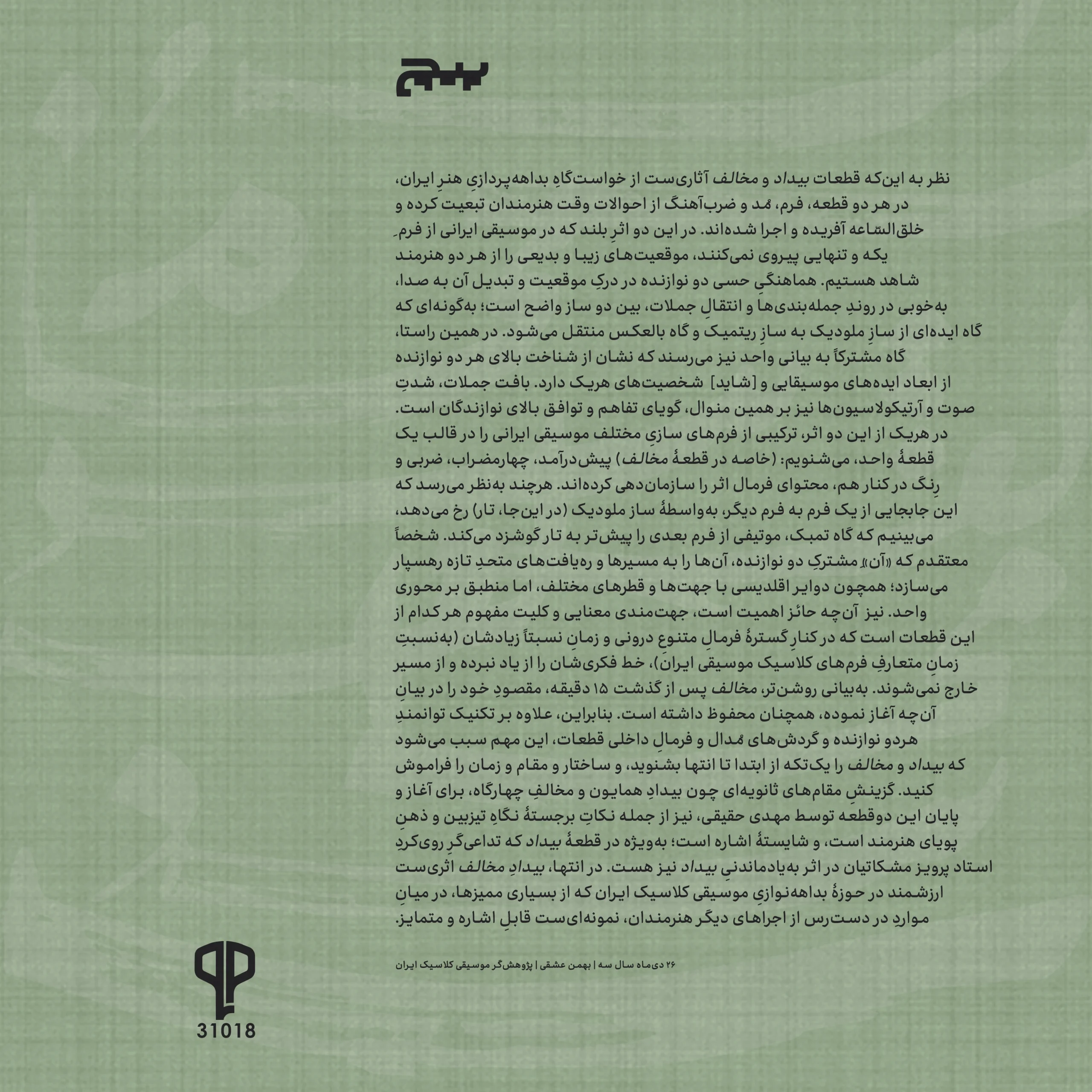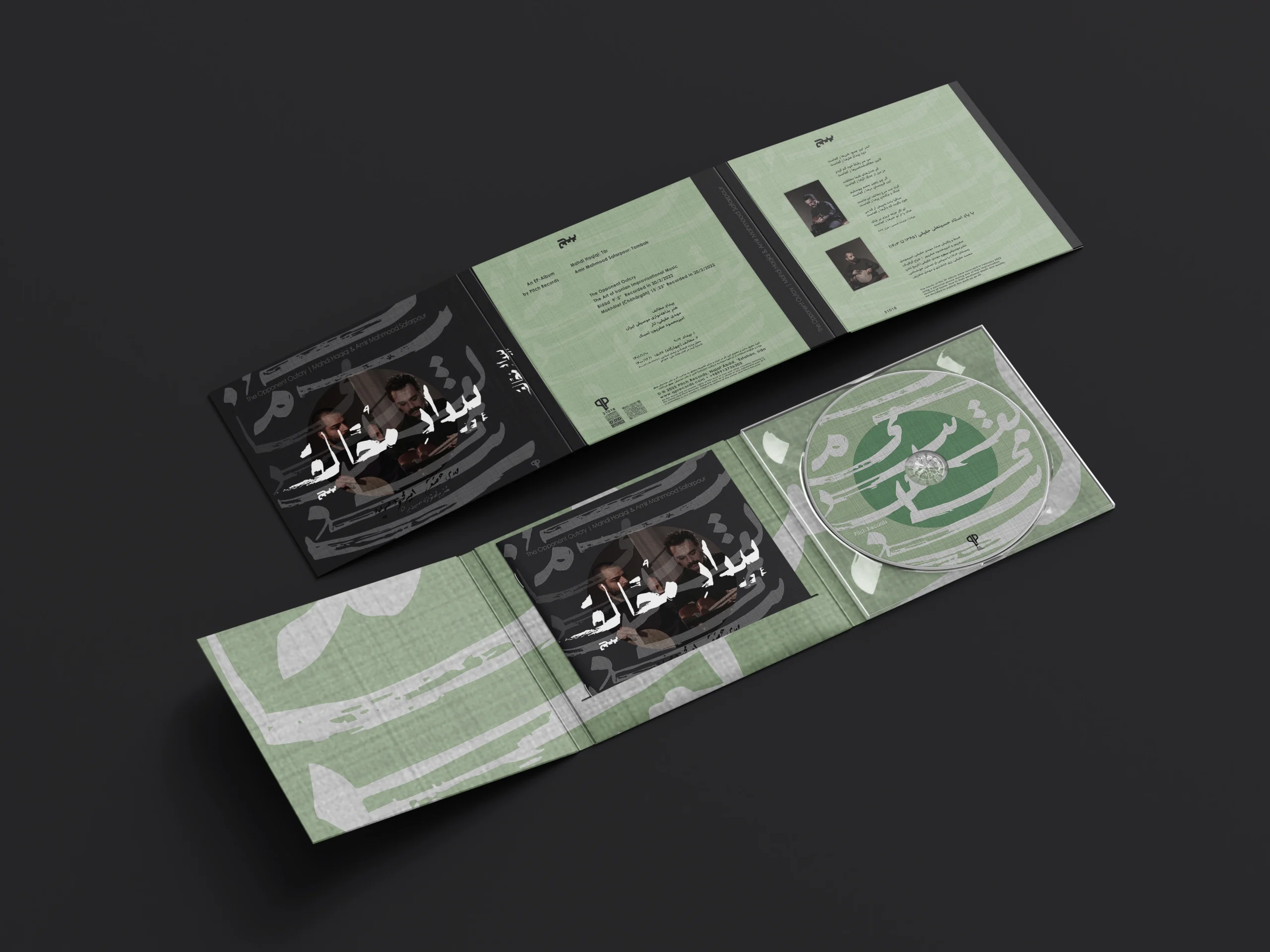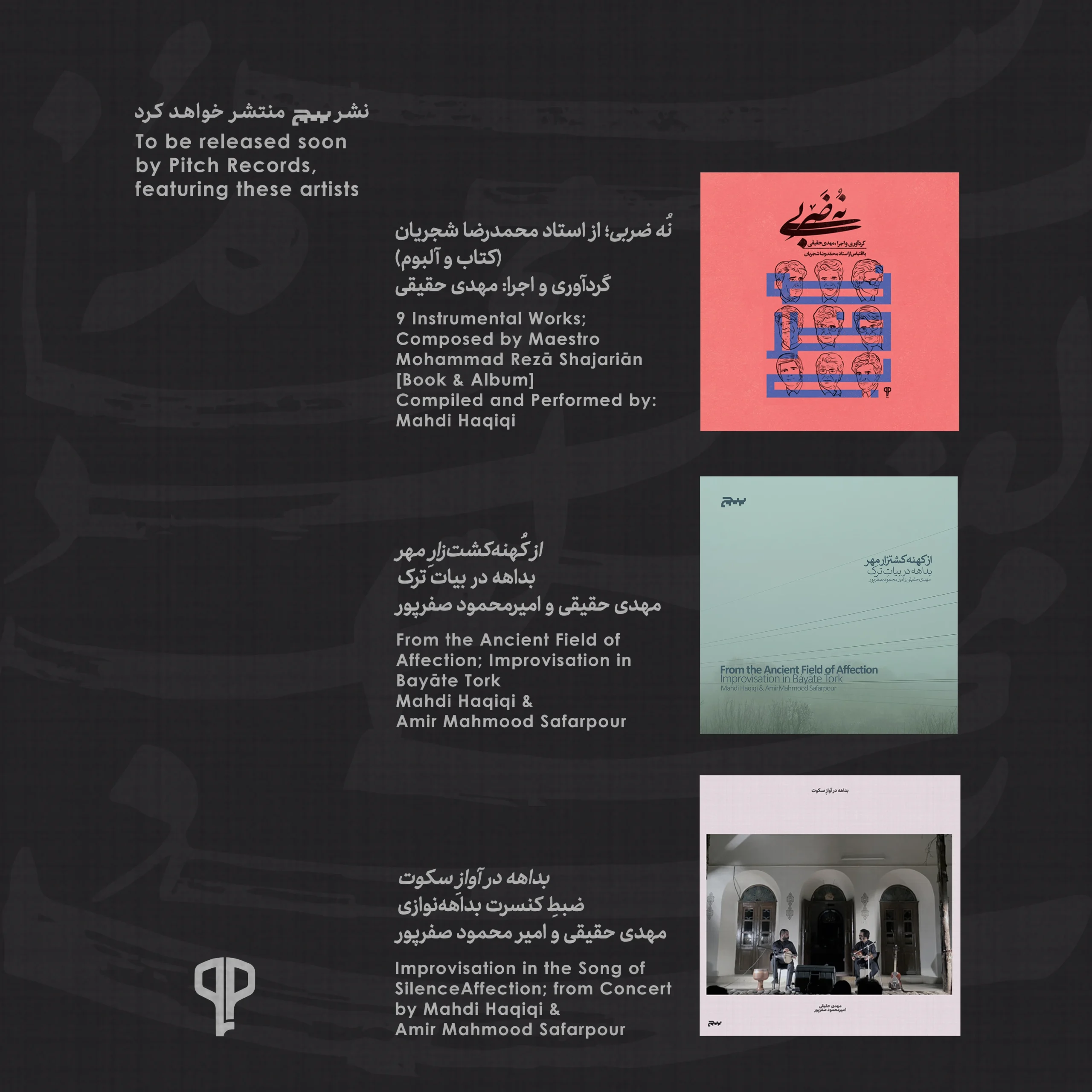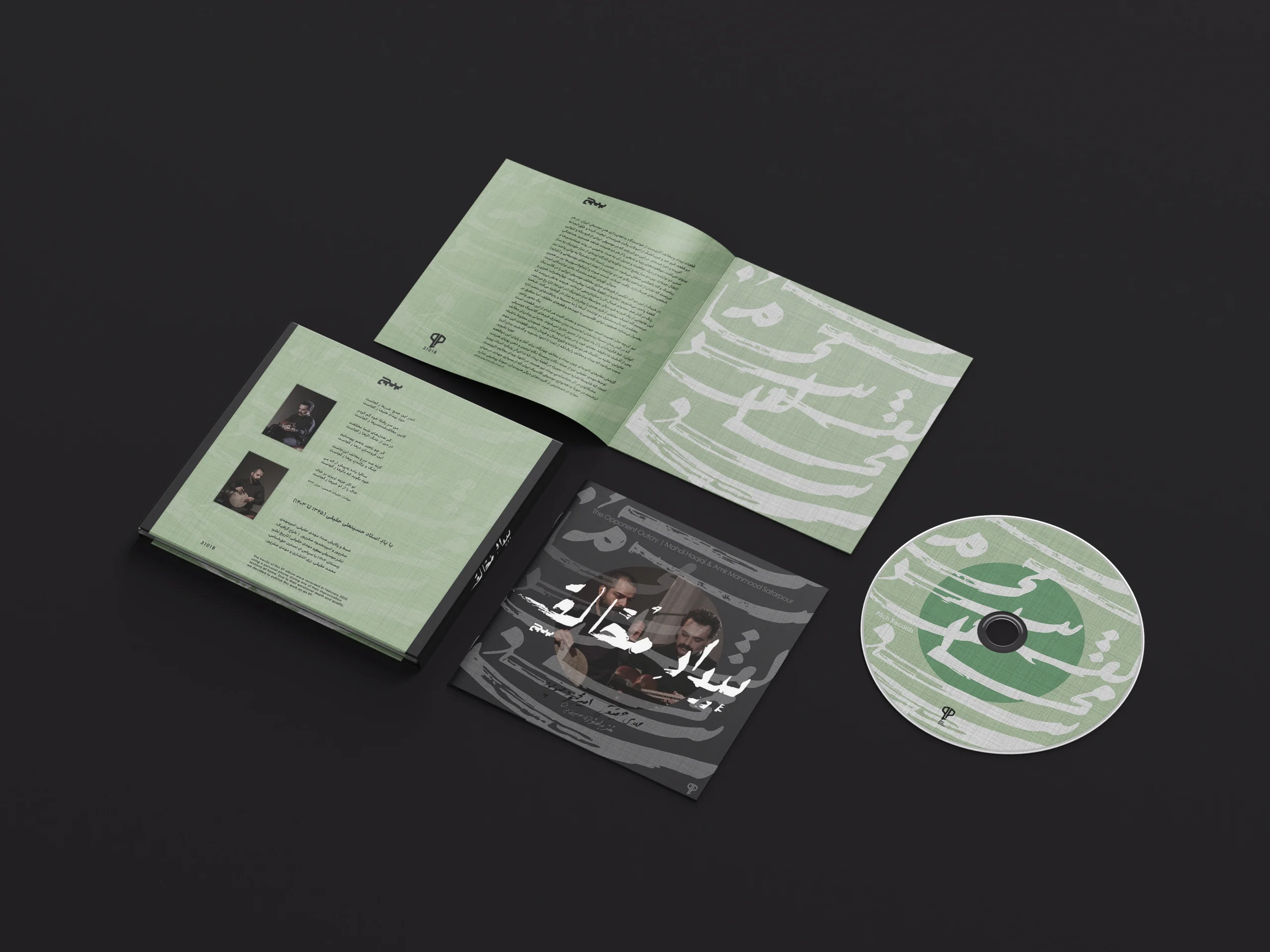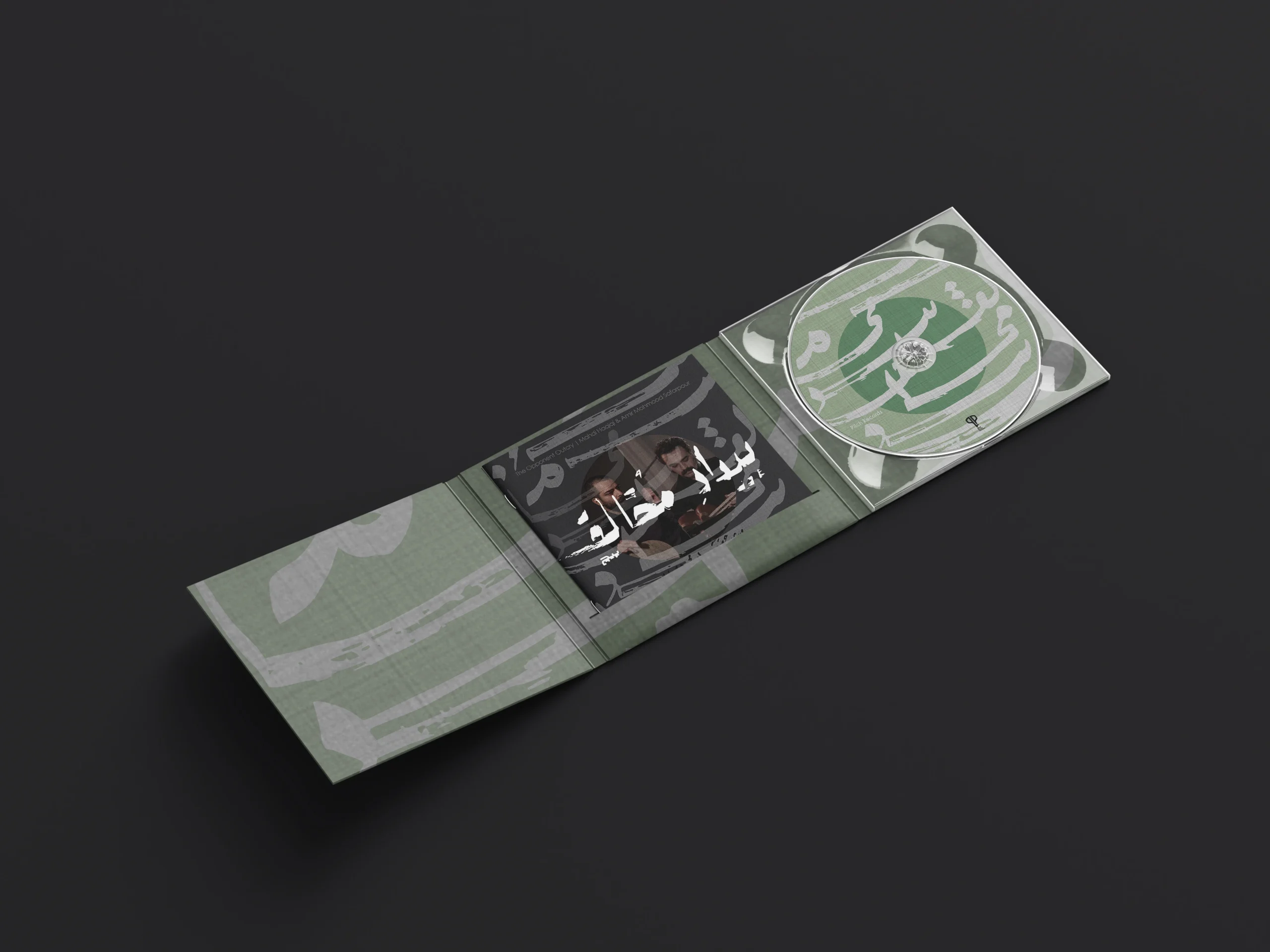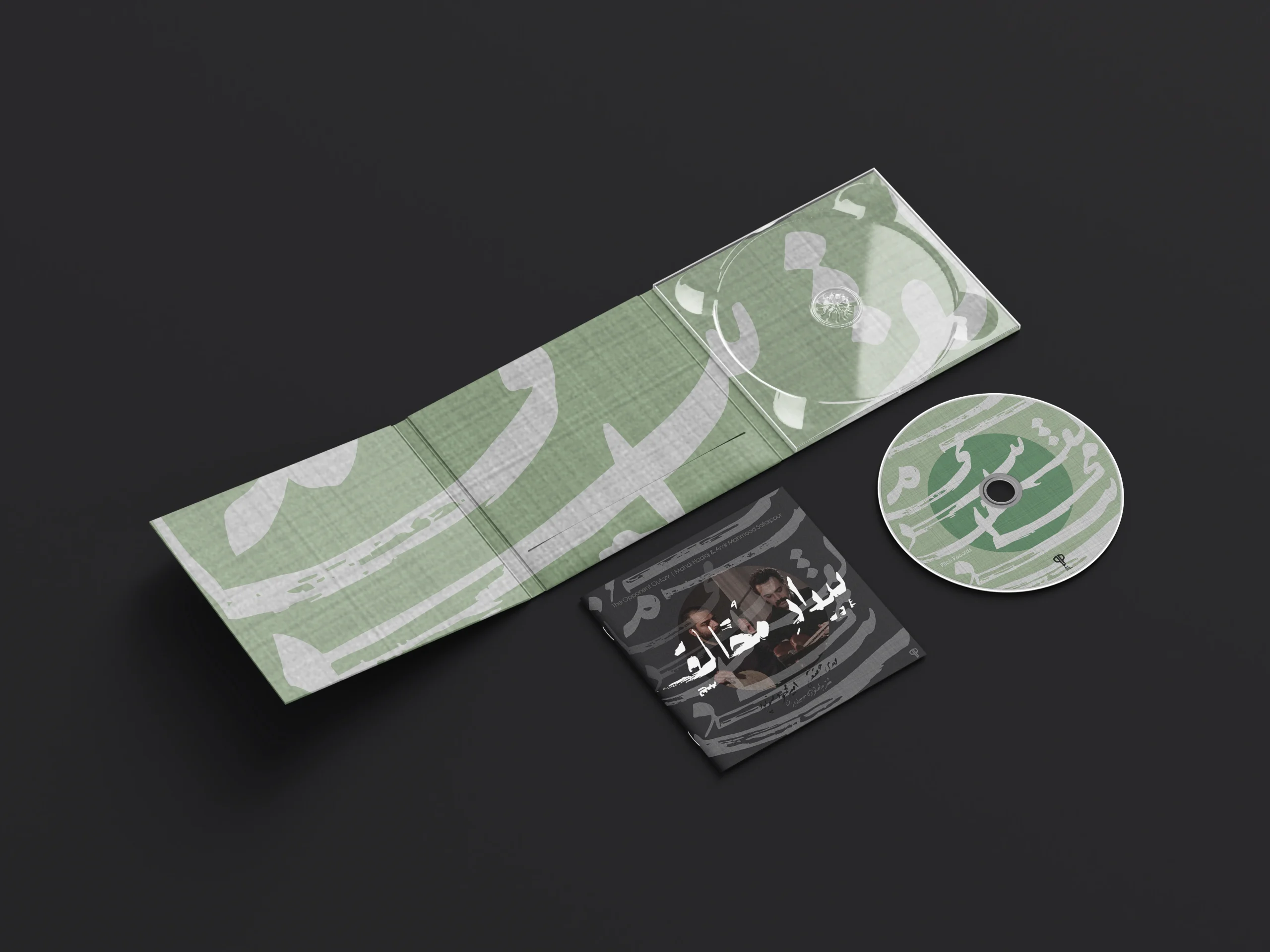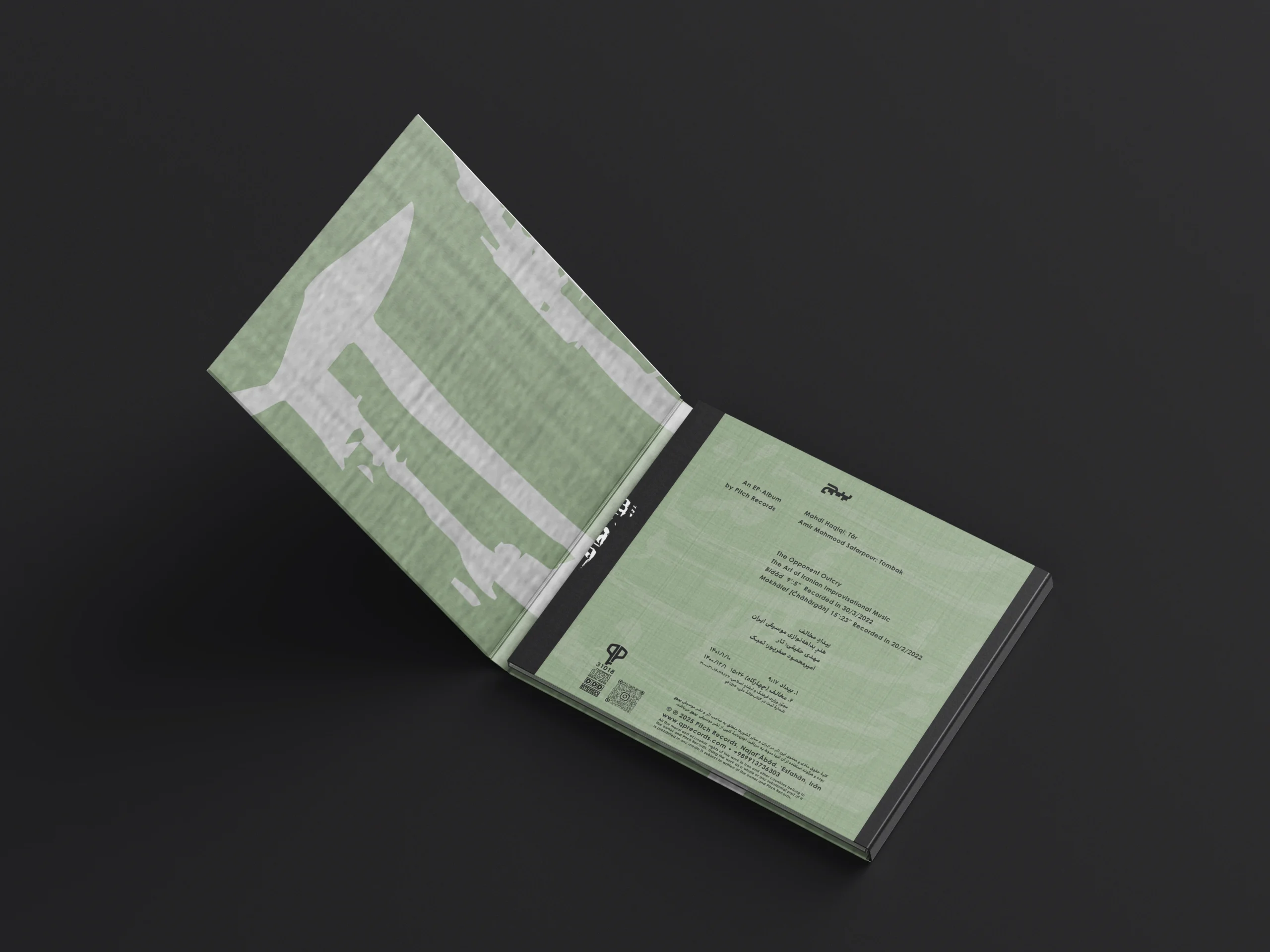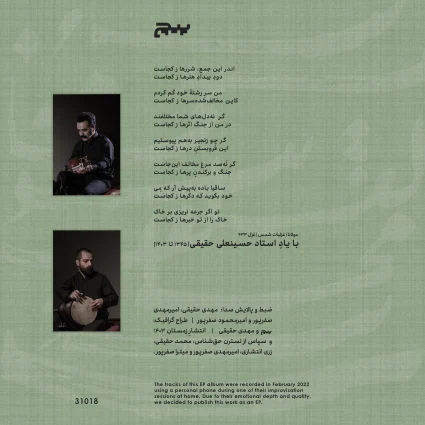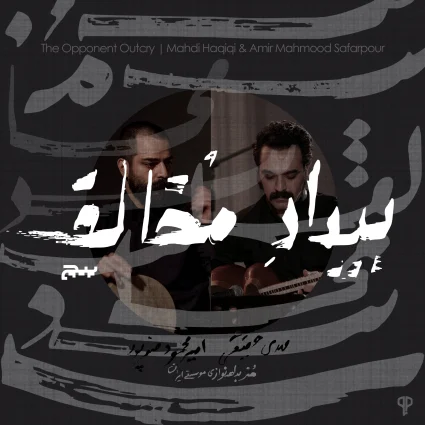Bidad Single From Bidad Mokhalef Album
Rumi | Divan of Shams | Ghazal 433
Translated into English
From where comes this fire, this burning in our midst?
Whence the smoke that strangles the art of the artist?
I’ve lost the thread that once led me true
These knots in the mind, where did they come from too?
If your hearts were not so far apart,
Why would I feel such wars within my heart?
If we’re bound together like links in a chain,
Why are the doors shut tight again?
If not for a hundred birds at odds in the air,
Why this plucking of wings laid bare?
O Cupbearer, bring forth the wine
Let it reveal what hides behind the sign.
And you if you don’t spill a drop on the ground,
Then how would the dust know what truths abound?
تومان 100,000 – تومان 150,000
Description
An Analytical Overview of “Bidād” and “Mokhālef”
Improvised Masterpieces in Classical Persian Music
The pieces Bidād and Mokhālef originate from the deep-rooted tradition of improvisation in Persian classical music. In both compositions, form, mode, and rhythm are shaped by the artists’ emotional states in the moment created and performed spontaneously, in real time.
These extended works defy the solitary, rigid forms often associated with traditional Persian music, offering instead dynamic and innovative musical landscapes. The intuitive connection between the two performers in perceiving each musical moment and translating it into sound is clearly reflected in the phrasing and the seamless exchange of motifs between the melodic and rhythmic instruments. At times, a melodic idea flows into the rhythmic instrument, and at others, it moves in the opposite direction.
This shared musical language often leads to a unified expression, demonstrating the artists’ deep understanding not only of musical ideas but also of each other’s artistic personalities. The texture of phrases, the dynamic intensity, and articulation patterns all point to a high level of musical synergy.
Each piece incorporates a blend of instrumental forms commonly found in Persian music, unified within a single cohesive composition. Especially in Mokhālef, we hear the integration of a prelude (Pishdaramad), a rhythmic solo (Chahārmezrāb), a metered section (Zarbi), and a closing dance-like piece (Reng), all forming a fluid structural narrative. While these transitions appear to be led by the melodic instrument (in this case, the tār), we also witness moments where the tombak anticipates a forthcoming motif and cues the tār accordingly.
In my view, the performers’ shared sensitivity guides them toward fresh, unified musical discoveries like Euclidean circles, distinct in direction and radius yet aligned on a common axis.
Equally significant is the conceptual direction and semantic unity of each piece. Despite their extended durations, especially compared to the more concise classical forms of Persian music, these compositions maintain their internal logic and emotional trajectory. To put it plainly, Mokhālef, even after 15 minutes, remains true to its original expressive intent.
Beyond the performers’ refined techniques and the intricate modal and formal shifts, this artistic coherence enables listeners to experience Bidād and Mokhālef as continuous, organic wholes inviting them to forget time, form, and mode altogether.
The choice of secondary modes such as Bidād-e Homāyoun and Mokhālef-e Chahārgāh for the opening and closing of each piece, as made by Mehdi Haghighi, highlights his sharp vision and vibrant musical imagination. This is especially evident in Bidād, which evokes the spirit of maestro Parviz Meshkatian’s celebrated work of the same name.
In conclusion, Bidād and Mokhālef stand as noteworthy contributions to the art of Persian classical improvisation. Distinguished by many subtle characteristics, they represent some of the most refined and memorable examples of contemporary performance in this genre.
Preview of Track:
Bidad
Additional Details
Additional information
| Artists | Amirmahmood Safarpour, Mahdi Haqiqi |
|---|---|
| Tracks | Bidad |
| Duration | Bidad (09:05) |
| Genre | Persian Traditional Music |
| Instruments | Tar By Mahdi Haqiqi, Tombak By Amirmahmood Safarpour |
| Recorded | Bidād was recorded in March 30, 2022 |
| Released | Winter of 2025 |
| Format | CD, Digital |
Pitch's Latest Releases
- بیداد Mahdi Haghighi - Amirmahmood Safarpour 1:00
- مخالف Mahdi Haghighi - Amirmahmood Safarpour 1:00
- تکآهنگ اول از آلبوم بداهه در آواز سکوت Mahdi Haghighi - Amirmahmood Safarpour 0:59
- تکآهنگ دوم از آلبوم بداهه در آواز سکوت Mahdi Haghighi - Amirmahmood Safarpour 0:59
- بیات ترک بخش اول Mahdi Haghighi - Amirmahmood Safarpour 1:00
- نوا Mahdi Haghighi - Amirmahmood Safarpour 1:00
- دشتی Mahdi Haghighi - Amirmahmood Safarpour 1:00
- Bayat'e Tork Mahdi Haghighi - Amirmahmood Safarpour 1:00
- پایان سپس آغاز Arash Pourmohammadi 0:51
You may also like…
About us
Pitch Music Publishing was founded in 2021 by Mahdi Haqiqi with the aim of producing, publishing, and distributing musical works in the form of CDs and organizing live concerts.
Pitch Music Publishing is committed to supporting independent artists in releasing their music across various formats and is active in a wide range of musical genres, styles, and functions.
contact us
East Nobahār, North Ferdowsi ,Najaf’Ābād, ‘Esfahān, Iran
+989913736303
contact@qprecords.com
- No.3, East Nobahār, North Ferdowsi ,Najaf’Ābād, ‘Esfahān, Iran
- +989913736303
- contact@qprecords.com

About us
Pitch Music Publishing was founded in 2021 by Mahdi Haghighi with the aim of producing, publishing, and distributing musical works in the form of CDs and organizing live concerts.
Pitch Music Publishing is committed to supporting independent artists in releasing their music across various formats and is active in a wide range of musical genres, styles, and functions.
 My Account
My Account  Wishlist
Wishlist 


